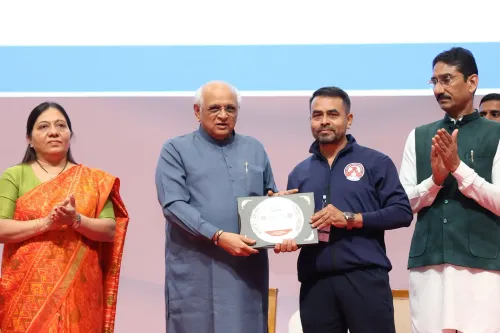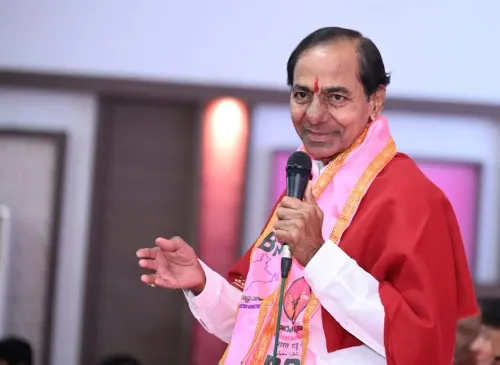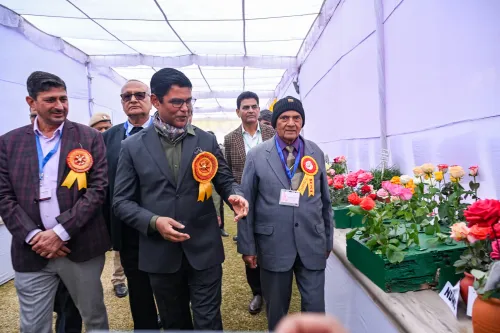Kerala Requests SC to Dismiss Presidential Reference on Gubernatorial Timelines?

Synopsis
Key Takeaways
- Kerala's application challenges the Presidential reference.
- Questions raised are already settled by prior judgments.
- The case could impact gubernatorial authority.
- Supreme Court's decisions may set future precedents.
- Legal dynamics between states and the Centre are under scrutiny.
New Delhi, July 28 (NationPress) The state of Kerala has submitted a plea to the Supreme Court, urging the esteemed judiciary to dismiss the reference made by the President under Article 143 of the Constitution.
Following the judgment in the Tamil Nadu Bills case, President Murmu, in May this year, sought the apex court's opinion on whether it is feasible to impose timelines on Governors regarding their actions on Bills, especially in scenarios where a constitutional timeline is absent. The President also requested insights on the constitutional options available to a Governor upon receiving a Bill under Article 200 of the Constitution.
In its application submitted to the Supreme Court, Kerala contended that the Presidential reference is not sustainable and requested its dismissal.
The application asserted that the Presidential reference “overlooks” a crucial element, indicating that the first 11 of the 14 queries posed are directly addressed by the apex court's ruling in the case of 'The State of Tamil Nadu vs. The Governor of Tamil Nadu'.
“The existence of this judgment is notably omitted in the reference, which alone warrants its rejection,” claimed Kerala’s application.
It further mentioned that “questions 1 to 11 are no longer res integra, and the current reference attempts to utilize the jurisdiction under Article 143 to grant the Supreme Court an appellate authority to overturn its own judgment, which is entirely impermissible.”
Kerala's application also pointed out that the Centre has not filed any review or curative petition against the judgment delivered in the Tamil Nadu case, thereby indicating acceptance of the ruling.
Kerala sought a declaration asserting the Presidential reference is not maintainable and has been submitted while suppressing significant facts; it requested for the reference to be returned unanswered.
On July 22, a 5-judge Bench led by Chief Justice of India (CJI) B.R. Gavai issued notices to the Centre and all state governments regarding the matter titled “In Re: Assent, Withholding or Reservation of Bills by the Governor and the President of India”.
This special Bench, which also included Justices Surya Kant, Vikram Nath, P.S. Narasimha, and Atul S. Chandurka, sought assistance from Attorney General of India R. Venkataramani, the foremost legal officer of the Centre for the resolution of the Presidential reference.
During the hearing, Senior advocate K.K. Venugopal, representing Kerala, raised concerns regarding the proceedings' maintainability.
Likewise, senior advocate P. Wilson, representing Tamil Nadu, argued that the questions in the Presidential reference had already been resolved by the apex court in the Tamil Nadu Bills case and contested its maintainability.
When Wilson expressed that the Presidential reference impacted Tamil Nadu's interests, CJI Gavai's Bench remarked that the matter pertains not just to Tamil Nadu but to all states, necessitating their involvement in the discussions.
In April 2025, a two-judge Bench of the Supreme Court, exercising its inherent powers under Article 142 of the Constitution, addressed a standoff between the Tamil Nadu government and Governor R.N. Ravi concerning delays in granting assent to Bills passed by the Assembly.
The court ruled that Governor Ravi's refusal to approve 10 Bills in Tamil Nadu was both “illegal and arbitrary,” establishing a three-month deadline for Presidential and gubernatorial approval of Bills passed by the legislature for a second time.
“The President is mandated to make a decision on the Bills reserved for his consideration by the Governor within three months from the date of receiving such a reference,” stated the Bench comprising Justices J.B. Pardiwala and R. Mahadevan.
If there is no decision within this stipulated timeframe, states are entitled to file writ petitions seeking a writ of mandamus against the President, clarified the Justice Pardiwala-led Bench.
The apex court exercised its extraordinary powers to declare the 10 withheld Bills as deemed to have received assent on the date they were presented to the Governor after being reconsidered by the state legislature.
The court affirmed that once a Bill is returned, re-passed by the legislature, and presented again to the Governor, it is not within the Governor's discretion to reserve it for the President’s consideration.
This ruling seemingly subjected Presidential actions to judicial review by establishing a three-month deadline for granting assent to Bills, prompting the President to make a reference under Article 143 of the Constitution.
Article 143 stipulates that the President may invoke the advisory jurisdiction of the Supreme Court on matters of public significance or constitutional interpretation.










